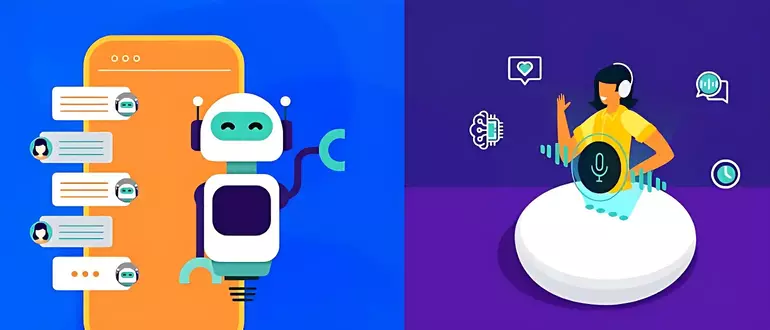
As AI technology advances, many industries wonder if machines will replace human workers.
One field that has been under the microscope is content writing. As AI programs become more sophisticated, some wonder if they will take over the role of human writers.
In this blog post, we’ll explore the impact of AI, how AI can streamline this sector, skills that should learn by content writers, and how can content writers able to train AI.
Will AI Replace Content Writers?
No. AI is unlikely to replace content writers completely as it needs a more creative touch and human insight required for engaging content.
According to Google’s guidelines, AI writing is considered spam and is not allowed. AI-generated content is not necessarily reliable or of good quality.
Content creation requires a level of understanding of the target audience that AI can only guide through data analysis.
Therefore, while AI can be a valuable tool for content writers, it is likely to replace them partially.
What Are The Impacts Of AI On The Job Market For Content Writers?

AI-generated content
One of the most significant impacts of AI on the job market for content writers is the rise of AI-generated content.
AI-powered tools and software can write articles, blog posts, product descriptions, and social media posts with minimal human intervention.
This technology is already in use by major news organizations, e-commerce companies, and marketing agencies.
For example, The Washington Post uses software called Heliograf to automatically generate news stories.
Heliograf analyzes data, identifies trends, and creates news articles in a matter of seconds.
Similarly, AI-powered content creation tools like Articoolo and Wordsmith can generate blog posts and articles on any topic within minutes.
Content optimization
Another impact of AI on content writing jobs is the increasing need for content optimization.
AI-powered tools can analyze the performance of content and provide insights on how to optimize it for better search engine rankings, engagement, and conversions.
For instance, tools like Clearscope and MarketMuse use AI algorithms to analyze content, identify gaps in information, and provide recommendations to improve the content’s relevancy and comprehensiveness.
These tools help content writers to create high-quality, data-driven content that resonates with the target audience.
Chatbots and voice assistants

AI-powered chatbots and voice assistants are also changing the way content is created and consumed.
Chatbots are automated tools that can handle customer inquiries, provide customer support, and assist in online purchases.
Voice assistants like Alexa and Siri can provide information, make recommendations, and execute commands based on voice inputs.
As a result, content writers need to create content that is optimized for voice search and conversational queries.
They also need to consider the context and intent of the user’s query and provide relevant and accurate information.
Personalization
AI is also affecting content writer jobs in personalization. AI can analyse user behavior, tastes, and demographics to create personalised content.
Netflix recommends movies and TV shows based on viewing history and tastes using AI algorithms. E-commerce sites use AI to personalise product recommendations and offers based on user buy history and browsing behaviour.
Content authors must create personalized, audience-relevant content to compete. Data-driven insights are needed to build content that addresses user wants, preferences, and pain points.
Collaboration with AI
Lastly, content writers need to collaborate with AI-powered tools and software to stay competitive in the job market.
AI can assist content writers in tasks like research, data analysis, and content optimization, enabling them to focus on the creative aspects of content creation.
For example, AI-powered research tools like Iris.ai and Semantic Scholar can assist content writers in finding relevant research papers and articles.
AI-powered editing tools like Grammarly and ProWritingAid can assist content writers in improving the readability, clarity, and grammar of their writing.
How Can AI Streamline Content Creation And Production?

Personalization of Content
One of the most significant advantages of using AI in content creation is its ability to personalize content.
By analyzing user behavior and preferences, AI can suggest personalized content, making it more relevant to the reader.
For instance, AI-powered tools like chatbots can analyze a customer’s behavior on a website and suggest relevant content or products based on their browsing history.
This level of personalization not only improves the user experience but also helps to build brand loyalty.
Streamlining Content Production
AI can also streamline the content production process by automating repetitive tasks. For instance, content writers can use AI-powered tools like Grammarly and Hemingway Editor to check for grammatical errors, spelling mistakes, and syntax errors.
Content creators can automate image cropping, video editing, and social media scheduling with AI-powered tools.
Automation lets content creators focus on creativity rather than tedious, time-consuming jobs.
Improved SEO Optimization

AI-powered tools aid SEO too. (SEO). AI can find the best keywords and phrases for your content by analysing search patterns.
This boosts search engine rankings, making your content easier to find and engage with. AI can also analyse reader engagement to help you enhance and optimise your content.
Enhanced Content Creation
AI can also help to enhance the quality of your content by suggesting topics, providing insights, and generating new ideas.
For instance, AI-powered tools like Google Trends can help you identify trending topics, while tools like CoSchedule’s Headline Analyzer can help you create compelling headlines.
Additionally, AI-powered tools like OpenAI’s GPT-3 can generate new content ideas and even write articles, taking some of the pressure off content creators and producers.
How To Training AI To Produce High-Quality Content?

Define the problem and the dataset
The first step in training AI to produce high-quality content is to define the problem and the dataset.
This involves specifying the type of content you want the AI to generate, the language it should use, and the target audience.
It’s also essential to gather and curate a large dataset of high-quality content that the AI can learn from.
Choose an AI model
GPT-3, GPT-2, BERT, and other AI models can generate content. Choosing the right type is important because each has pros and cons.
Fine-tune, the model
After selecting the AI model, it’s time to fine-tune it on your dataset. This involves training the AI on your curated dataset and adjusting the model’s parameters, such as learning rate, batch size, and epochs.
The goal is to optimize the AI’s performance on your specific task.
Generate content
Once the AI model is trained, you can use it to generate high-quality content. You can either input a prompt and let the AI generate the content from scratch or provide some initial text and let the AI continue writing.
Evaluate the content
Evaluating the AI-generated content is essential to ensure it meets the desired quality standards.
You can use coherence, fluency, and relevance metrics to assess the content’s quality. It’s also helpful to have human evaluators review the content and provide feedback.
Iterate and improve
You can enhance the AI model by fine-tuning it based on evaluation results. To get the desired quality, you may need to tweak the dataset, model, or training settings.
Deploy and monitor
After training the AI model and generating high-quality content, it’s time to deploy it in production. It’s crucial to monitor the AI’s performance and continue to fine-tune it based on feedback and user behavior.
What Skill Should Learn By A Content Writer To Stay Relevant In The Age Of AI?

Continuous Learning:
The age of AI is characterized by constant change, and content writers must keep up with the latest trends and technologies.
Continuous learning is essential to staying relevant and competitive in the industry. Content writers should seek out opportunities to learn new skills, such as attending industry events or taking online courses.
Communication Skills:
Strong communication skills are vital for content writers. They must be able to convey ideas effectively and engage with their audience.
Writing grammatically correct sentences and ensuring proper punctuation and spelling are crucial, but becoming a great writer involves more than that.
Creating high-quality, engaging content

Quality, engaging content is crucial in the AI era. Content authors must create informative, entertaining, and relevant content because AI algorithms prioritise user-valued content. Use storytelling, visuals, and actionable lessons.
Creativity:
Being able to think creatively is an essential skill for content writers. It is important to be able to produce unique and engaging content that stands out from the competition.
Content writers should be able to look at a topic from a different perspective and develop creative solutions.
Editing Skills:
Editing skills are just as important as writing skills. First drafts are rarely perfect, and editing skills require patience, discipline, and attention to detail.
Content writers should look for redundant points, overused words, and grammatical errors.
Developing an SEO strategy

One skill that content writers should learn to stay relevant in the age of AI is search engine optimization (SEO).
As AI becomes more sophisticated, search engines are relying on AI algorithms to rank web pages based on their relevance and quality.
Content writers need to develop an SEO strategy that ensures their content is optimized for search engines and meets the needs of their target audience.
This includes conducting keyword research, optimizing title tags and meta descriptions, and creating high-quality content that addresses user intent.
Understanding data analysis and analytics
Data analysis and analytics are essential skills for content writers in the age of AI.
AI algorithms rely on data to provide insights and improve performance, so content writers need to have a solid understanding of data analysis and analytics.
This includes understanding how to collect and interpret data, use analytics tools to measure performance, and optimize content based on data insights.
Collaboration Skills:
Content authors must collaborate with other writers, designers, and developers.
Content writers must collaborate, discuss, and accept criticism. High-quality client-focused writing requires collaboration.
Embracing emerging technologies
Finally, content writers must be willing to embrace emerging technologies to stay relevant in the age of AI.
This involves exploring new content creation tools like AI-powered writing assistants and formats like augmented reality and virtual reality.
Content writers can stay ahead of the curve and meet audience wants by adopting new technologies.
FAQs
Why Can’t AI Completely Replace Human Content Writers?
AI lacks empathy and creativity, which are skills that human writers possess and use to craft nuanced, emotional, and engaging content.
Humans are good at things that AI cannot replicate.
What Tasks Can AI Help With In Content Writing?
AI can help with certain writing tasks such as editing, SEO copywriting research, and headline testing.
AI can also be used for fact-finding, keyword-churning, and content creation for commodity brands.
What Are The Limitations Of AI In Content Writing?
AI has limitations when it comes to emotion and imagination.
AI-generated content cannot express human emotion 100% accurately and cannot evoke the same feelings as human-generated content.
Are There Any Recommended AI Content-Writing Tools Available?
Some recommended AI content-writing tools include OpenAI, which is useful for a variety of writing tasks, and Jarvis AI content writer, which is a good paraphrasing tool.
Will AI Replace Most Creative Writers?
Most experts agree that AI will not replace most creative writers for a very long time.
While AI can help with certain writing tasks, it is not likely to be good at writing rule-bending or inspirational writing.
Conclusion
AI technology has made progress in creating content, but it probably won’t ever be able to do away with human content writers completely.
Writers are still the best at capturing the subtleties of language, imagination, and emotional intelligence.
But AI tools can help improve the way content is made and give writers more time to work on more important jobs.
The key is to take advantage of AI’s benefits while also recognizing and appreciating the special skills that human writers have.




